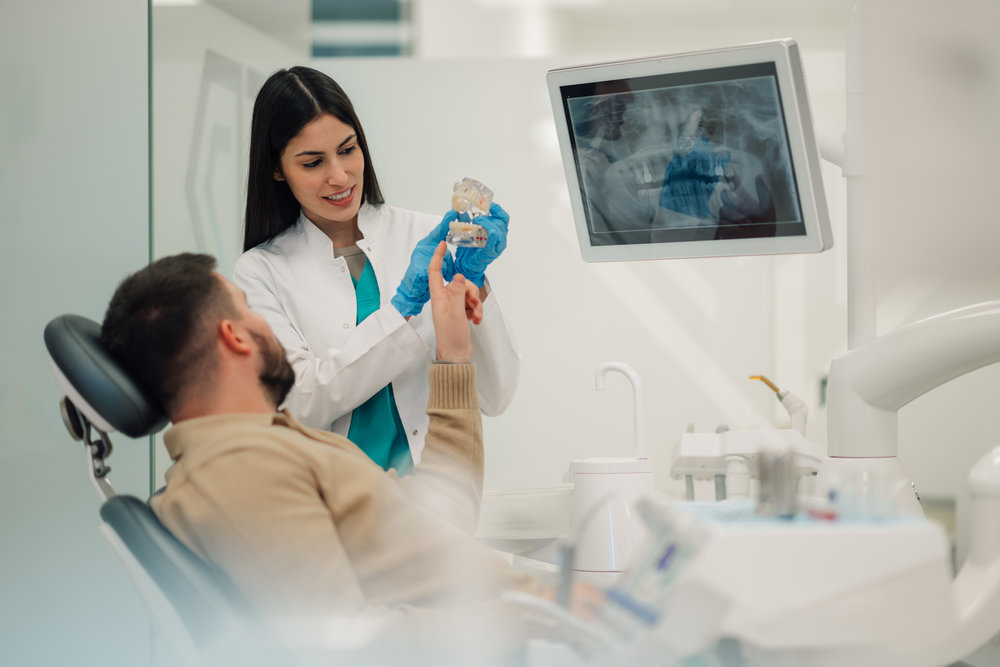
When sudden, throbbing pain strikes your gums, distinguishing between a gingival abscess and a periodontal abscess becomes crucial for getting the right treatment. Both conditions involve bacterial infections that create painful pus-filled pockets, but they originate from different sources and require distinct approaches to restore your oral health.
At Middlesex Periodontics & Dental Implants, we understand how concerning these painful infections can be for patients. Dr. Daniel Reich and our experienced team provide advanced periodontal care to diagnose and treat both types of abscesses, helping you achieve lasting relief and prevent future complications through proven treatment methods.
The primary distinction between these two types of abscesses lies in their location and underlying cause. A gingival abscess develops in the gum tissue near the tooth’s surface, typically resulting from food particles or foreign objects becoming trapped between the tooth and gum. This surface-level infection remains confined to the outer gum tissue and often appears as a small, raised bump.
A periodontal abscess, however, forms deeper within the gum tissue and affects the supporting structures around the tooth root. This more serious condition usually develops when bacteria from existing gum disease penetrate deeper into the periodontal pockets. An abscessed tooth occurs when bacteria enters through decay, periodontal disease, or a cracked tooth, causing infection and pus buildup that can threaten the tooth’s stability.
Recognizing the warning signs of each type of abscess allows for prompt treatment and better outcomes. Gingival abscesses often present with visible swelling, redness, and a small pustule on the gum surface. The affected area may feel tender to touch, and you might notice a bad taste in your mouth or mild discomfort when chewing.
Periodontal abscesses typically produce more severe symptoms that develop rapidly. These may include significant swelling that extends beyond the immediate gum area, intense throbbing pain, sensitivity to temperature changes, and possible fever. The affected tooth may feel loose or elevated, and you might experience difficulty opening your mouth fully.
Both conditions can cause bad breath and an unpleasant taste, but periodontal abscesses often produce more pronounced systemic symptoms. If you notice facial swelling, fever, or difficulty swallowing, seek immediate professional periodontal care as these signs may indicate a spreading infection.
Certain symptoms require immediate attention regardless of the abscess type. Facial swelling, difficulty breathing or swallowing, high fever, or rapid progression of symptoms warrant emergency care. These signs may indicate the infection is spreading to surrounding tissues or entering the bloodstream.
Treatment strategies vary based on the type and severity of the abscess. Gingival abscesses often respond well to conservative treatment approaches. Your periodontist may recommend warm salt water rinses, gentle cleaning of the affected area, and sometimes antibiotics to control the infection. In many cases, removing the trapped debris and maintaining proper oral hygiene resolves the condition.
Periodontal abscesses require more comprehensive treatment due to their deeper location and connection to underlying gum disease. Treatment may require draining the abscess to relieve pressure and remove infected material. Your periodontist may then perform scaling and root planing to clean the tooth root surfaces and eliminate bacteria from the periodontal pockets.
Advanced cases often require surgical intervention to access and clean the infected area thoroughly. Some situations benefit from regenerative procedures to restore damaged periodontal tissues and bone support around the affected tooth. The goal remains preserving your natural tooth while eliminating the infection and preventing recurrence.
Prevention strategies focus on maintaining excellent oral hygiene and addressing risk factors that contribute to bacterial infections. Regular brushing and flossing remove plaque and food particles that can lead to gingival abscesses. Pay special attention to the gum line and areas where food commonly becomes trapped.
For periodontal abscess prevention, consistent professional cleanings and periodontal maintenance become essential. These appointments allow your dental team to monitor gum health, remove hardened tartar deposits, and identify potential problem areas before acute infections develop. Patients with a history of gum disease may need more frequent cleanings to maintain optimal periodontal health.
Lifestyle factors also play a role in prevention. Avoiding tobacco products, managing stress levels, maintaining a balanced diet, and addressing teeth grinding habits all contribute to better gum health and reduced infection risk.
When you experience symptoms of a gingival or periodontal abscess, prompt professional evaluation provides the best outcomes for your oral health. Dr. Daniel Reich brings over 25 years of experience as a board-certified periodontist to every patient interaction, ensuring you receive accurate diagnosis and effective treatment. Our practice utilizes advanced laser therapy and state-of-the-art techniques to provide comfortable, efficient care for all types of periodontal infections.
We understand that dental emergencies can be stressful and painful, which is why our team prioritizes prompt scheduling and comprehensive treatment planning. From initial evaluation through complete healing, we provide the guidance and care you need to restore your oral health and prevent future complications. Contact us at (732) 257-7300 or use our convenient online contact form to schedule your consultation and get the relief you deserve.